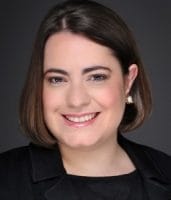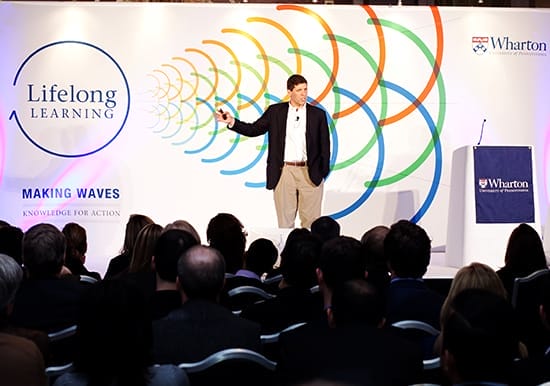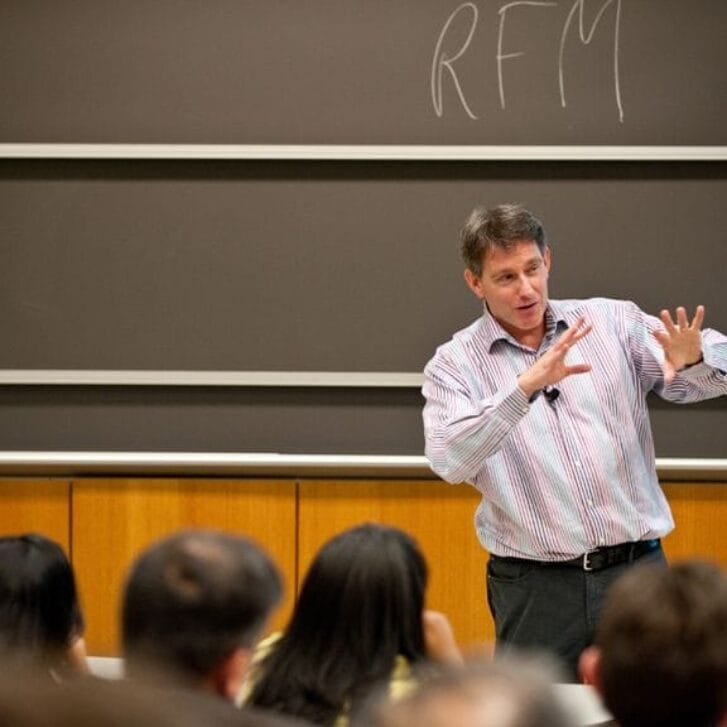Whilst you’d be forgiven for expecting a finance lecture at the Lifelong Learning Tour event in London on November 14, you’d be wrong. When alumni were given a vote, marketing was the topic winner. Peter Yordan, WG’11, observed, “I get enough finance at work. I wanted to hear something different from what I could learn in my day job.”
This view was shared by those at the other end of the graduate spectrum.
“Definitely a good use of time,” remarked Peter Woolsey, WG’66. “I’ve gotten many ideas, and it is clear to see how Wharton’s pioneering research can benefit European businesses operating with so many different cultures.”
After all, who wouldn’t want to predict accurately, at an individual level, what specific customers were likely to buy, in what quantities, and rate the risk of them defecting to competition? Regardless of industry, this would generate tremendous advantage. It’s also precisely where the School is pioneering the way with its Wharton Customer Analytics Initiative (WCAI) started by Eric Bradlow, the K.P. Chao Professor, and Peter Fader, the Frances and Pei-Yuan Chia Professor, in 2011 and discussed at the event. No other business school comes close in this sphere.
To learn more, you can see the video for the London session, as well as similar events in other cities, via http://lifelonglearning.wharton.upenn.edu/videos. Or you can visit www.wharton.upenn.edu/wcai, where not only can you sign up for the newsletter, but also you can explore opportunities to partner with the WCAI to solve your most difficult problems.
For example, as explained by Elea Feit, executive director of the WCAI, most recently Hertz delivered a data set including employee engagement surveys, transactions of rental cars in those locations along with the customer satisfaction surveys for those transactions. The end goal for Hertz is to understand and predict customer loyalty and the effect of employee engagement on this.
Whilst I’m still mulling over how to leverage this myself, I’ll definitely be telling at least two fellow alumni they need to learn more about WCAI as it seems ideally suited to address their business challenges. I’m not the only one referring it on.
“I came out of personal interest and didn’t expect to learn much relevant to banking,” begins Winson Dam, ENG’97. “How wrong I was. My bank could definitely benefit from the analytics methods described, and I will be ensuring the right people know about it.”
As Bradlow pointed out, “Most of what Wharton taught you in marketing is becoming less and less relevant.”
In his talk, “The Golden Age of Marketing … Is Always in the Future,” Bradlow outlined how, over time, access to better data has continually moved the goalposts but never so much so as now.
“Today’s rapid pace of change is making marketing one of the hardest, yet most interesting, departments to be in,” he said.
As he pointed out, “Technological advances have entirely changed the face of marketing and what you can now measure is immense.”
Entirely new topics have had to be added to the curriculum, including sentiment analysis, Web scraping and adaptive experiments. The change is so profound that Bradlow expects that within five years students will be able to major entirely in customer analytics.
The main premise of Lifelong Learning is to blur the line between student and graduate. Vice Dean Sam Lundquist introduced the session saying the goal was for us to leave hungry for more, and Wharton certainly delivered. Until this lecture I was convinced I was done with academia. Now I’ll be keeping an eye out for the day Wharton introduces an executive course on customer analytics which I can fit around my work schedule. I’m sure others left the event feeling exactly the same way.
—Susan Marinakis
Susan Marinakis, WG’05, is senior product manager, ACUVUE® Brand Contact Lenses, for Johnson & Johnson Vision Care. She was kind enough to write this report for the Wharton Blog Network on behalf of the Wharton Club of the United Kingdom.


























